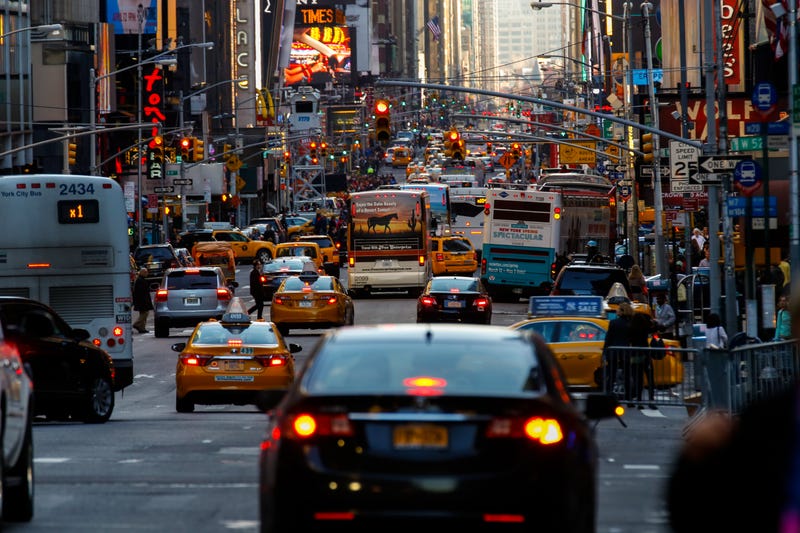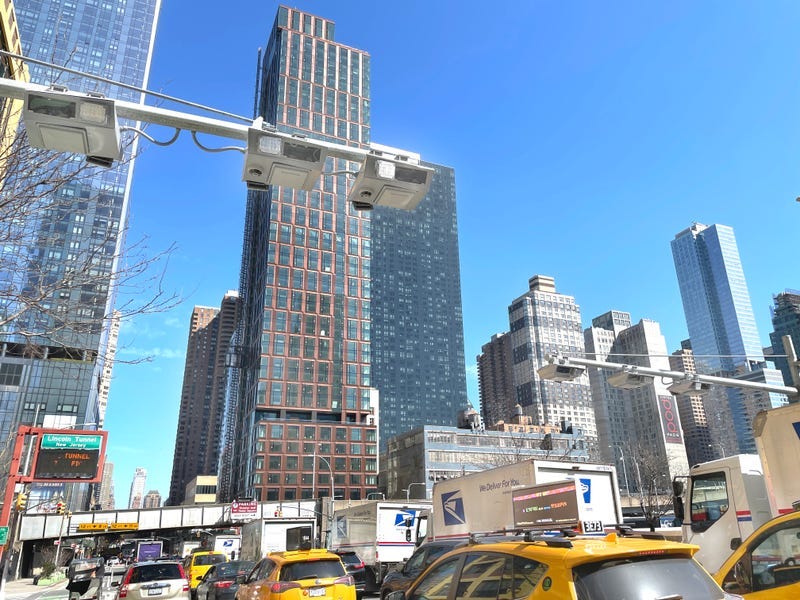
NEW YORK (1010 WINS/WCBS 880) – Gov. Kathy Hochul on Wednesday directed the MTA to "indefinitely pause" the congestion pricing plan for Manhattan—just weeks before it was set to begin—saying she has concerns about its impact on the finances of everyday New Yorkers and on the city's post-pandemic recovery.
In a recorded announcement to the state, Hochul called the move a "difficult decision" and said she still supports the overall environmental goals of the plan—including reducing congestion and pollution—but she said implementing the tolling “risks too many unintended consequences for New Yorkers at this time.”
She acknowledged “hardworking New Yorkers are being hammered by costs,” citing inflation and the high costs of living in the metro area. She also said circumstances have changed in Manhattan post-pandemic, including with the option of remote work.
"Let's be real, a $15 charge may not seem like a lot to someone who has the means, but it can break the budget of a hardworking or middle class household. It puts the squeeze on the very people who make this city go," she said in an address to the state.
“This decision is about doing what’s right for the people who make our city thrive,” she said. “I’m here to say we are listening.”
The governor said the state would continue to work with the city to "tackle congestion in other ways" and that her administration "remains fully committed" to transit improvements like increased accessibility and reliability, including track repairs, updated signals and new elevators.
"We will continue to pursue our environmental objectives, even as we pause congestion pricing," she said. "We will continue to find strategies to address congestion, and we will continue to find solutions that benefit both our planet and our people."
Politico reported that the governor is also concerned about the implications for vulnerable Democrats in competitive U.S. House races, with the November elections just five months away. Hochul appeared to address such conclusions, saying, "To those cynics who question my motivation, I approach every decision through one lens: What is best for New Yorkers?"
The congestion pricing plan is now "dead in the water," a source told WCBS 880, explaining it was voted into law in 2019 by then-Gov. Andrew Cuomo as a revenue stream for the MTA and that Hochul, who was once a vocal supporter of the plan, must now find other options.
Ongoing discussions between Hochul and the MTA will continue, but the plan is suspended for now with no implementation in sight. The state will be backstopping the MTA capital plan and exploring other funding options as needed, according to sources.
Mayor Eric Adams said Wednesday that he would support the governor’s decision to reassess. “If she’s looking at what others we can do it and how we can do it correctly, I’m all for it,” he said. “This is a major shift for our city and it has to be done correctly.”
Members of the MTA board, which oversees the transit agency, said they had not been briefed on the delay. “I’m in shock,” said Andrew Albert, a member of the board. ”We won’t get new buses, new subway cars, new signals. It’s a betrayal of the millions and millions of people who would have been helped by this.”

The stunning turnaround comes less than a month before the Manhattan congestion toll was set to begin on June 30. The MTA has already invested tens of millions of dollars installing cameras, sensors, license plate readers and other equipment on city roadways in anticipation of the plan’s launch. And the agency had planned a series of public webinars—set to start Wednesday—to explain to the public how the system would work. Those webinars are now postponed "until further notice," according to the MTA website.
The MTA has pushed ahead with the controversial tolling program despite a cascade of lawsuits and outcry from various groups, including cabbies, truckers, suburban commuters, small business owners and the state of New Jersey. Some of the lawsuits are still playing out in the courts.
Gov. Phil Murphy, who has said congestion pricing would harm New Jerseyans, applauded the decision in a statement, "Although we have had a difference of opinion with our colleagues in New York on congestion pricing implementation, we have always had a shared vision for growing our regional economy, investing in infrastructure, protecting our environment, and creating good-paying jobs on both sides of the Hudson River."
Rep. Josh Gottheimer, the Democrat who has led New Jersey's fight against congestion pricing, hailed the news, saying in a statement, "After a five year fight, New York appears to have done right by hardworking Jersey families and backed off their outrageous Congestion Tax."
Supporters of the plan have countered it will get more people using public transit, while reducing pollution, speeding up public buses and raising critical funds for the subway system. The MTA has previously said a thorough assessment was made of the impacts, pointing to the success of similar programs in other countries, as well as "4,000 pages of analysis, hundreds of hearings and outreach meetings."
The group Transportation Alternatives, which supports the plan, slammed Wednesday’s news, saying the governor had “sided with powerful special interests” and calling the move a “slap in the face to the millions of New Yorkers who rely on public transportation.”
“The next time your train is late, your bus is trapped in traffic, your subway station is still missing an elevator, you know who to blame: Governor Kathy Hochul,” the group’s statement continued.
The Riders Alliance, a major supporter of the plan, called an immediate protest Wednesday outside Hochul's office on Third Avenue to "make sure she knows the true political threat isn't charging suburban drivers to enter Manhattan, it's defunding transit improvements for millions of New Yorkers!"
Various elected officials from the boroughs also criticized the governor, including Comptroller Brad Lander, who wrote on X, "We’ve already waited 15 years. Delaying congestion pricing will derail our chance to create a modern, accessible transit system. It will deprive our city of cleaner air, safer streets and a more thriving economy. We can’t let short-term politics derail broad long-term benefits."
Under the plan, most people driving passenger vehicles into Manhattan below 60th Street—roughly the area south of Central Park—would have to pay at least $15 under the system, with larger vehicles paying more. Those tolls would come on top of the already hefty tolls for using bridges and tunnels to enter Manhattan, like the $13.38 to $17.63 it costs to take a car through the Lincoln or Holland tunnels.
The future of the plan is now up in the water, as are the potential repercussions of not implementing it. The MTA has said it would provide much-needed funds—about $1 billion a year—to help modernize the 100-year-old subway system.
The Associated Press contributed to this report.
